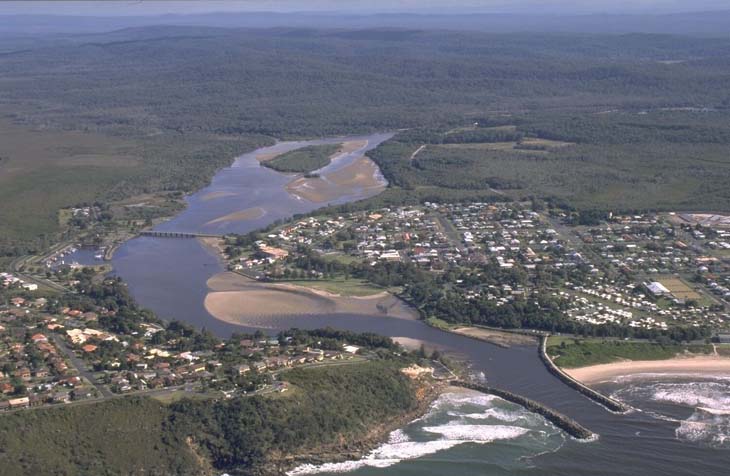Evans River flows into the sea at Evans Head on the North Coast of New South Wales. Classed as a barrier river estuary, its entrance has training walls that ensure the estuary remains permanently open.
Tuckombil Canal forms the upper reach of the estuary where a concrete weir marks its upper limit. This canal joins the Richmond River upstream of the weir via Rocky Mouth Creek. Despite these impacts on the upper estuary, the lower estuary is a popular destination for swimming and fishing.
Water quality report card
As part of our water quality monitoring program we assess the water quality and ecosystem health of an estuary using a range of relevant indicators. We sample a subset of the estuaries located between the Queensland border and Taree every 3 years. The most recent sampling in the Evans River was completed over the 2018–19 summer, when 2 sites were sampled on a monthly basis.
This report card represents 2 water quality indicators that we routinely measure: the amount of algae present and water clarity. Low levels of these 2 indicators equate with good water quality.
Algae
Water clarity
Overall grade
The report card shows the condition of the estuary was fair with:
- algae abundance graded poor (D)
- water clarity graded fair (C)
- overall estuary health graded fair (C).
Grades for algae, water clarity and overall are represented as:
- A – excellent
- B – good
- C – fair
- D – poor
- E – very poor.
Go to estuary report cards to find out what each grade means, read our sampling, data analysis and reporting protocols, and find out how we calculate these grades.
We have monitored water quality in the Evans River since 2007. This table shows the water quality grades for this estuary over that time.
| Year | Algae | Water clarity | Overall grade |
|---|---|---|---|
| 2007–08 | E | C | D |
| 2009–10 | C | C | C |
As part of our Beachwatch program we assess swimming suitability at 2 swimming sites in Evans River using microbial indicators. Richmond Valley Council collect samples at each site weekly between October and March, and weekly throughout the year for Evans River, to calculate the suitability grade. Sampling is ongoing. Each grade reflects the most recent 100 water quality results to April 2022. Find out more about how we monitor beach water quality.
| Local government area | Swim site name | Grade |
|---|---|---|
| Richmond Valley | Evans River | Poor |
| Richmond Valley | Elm Street Bridge North (Evans River) | Good |
Estuarine, lake and lagoon water can sometimes be unsuitable for swimming, especially after rainfall when stormwater and wastewater can overflow into swimming areas. Learn more about what the grades mean and how we grade swimming sites on the Beachwatch How we report webpage.
Water sampling and laboratory analysis were funded by Richmond Valley Council.
Physical characteristics
| Estuary type | Barrier river |
|---|---|
| Latitude | –29.11 (ºS) |
| Longitude | 153.44 (ºE) |
| Catchment area | 75.8 km2 |
| Estuary area | 2.7 km2 |
| Estuary volume | 2636.8 ML |
| Average depth | 1.1 m |
Tidal exchange volume
Tidal exchange volume or tidal prism data is available for this estuary. This tidal prism was measured in 2006.
| Tide state | Flow (106 m3) | Local tidal range (m) | Sydney Harbour tidal range (m) |
|---|---|---|---|
| Ebb flow | 2.38 | 1.91 | 1.67 |
| Flood flow | 2.47 | 1.75 | 1.65 |
Notes: km2 = square kilometres; m = metres; m3 = cubic metres; ML = megalitres.
Water depth and survey data
Bathymetric and coastal topography data for this estuary are available in our data portal.
Land use
The catchment of Evans River is highly disturbed. Although three-quarters of the catchment remains as forest, grazing, agricultural and urban development have resulted in significant modifications such as cleared land, and even to the river itself (that is, a canal and weir). Forested areas occur mostly in the southern catchment and are managed in conservation areas and by private land holders.
National and marine parks
- The largest conservation area in the Evans River catchment is Bundjalung National Park, which meets the river’s southern shoreline.
- Broadwater National Park meets the northern banks of Evans River.
- There is no marine park associated with this estuary.
Community involvement
- Evans River and Coastal Landcare works to improve riverbanks and dune areas.
- Evans River K-12 School Ecowarriors Landcare Group operates within the school to carry out a range of conservation and environmental projects.

Aerial view of Evans River estuary
Local government management
Local councils manage estuaries within their area unless the estuary is attached to a marine park.
Richmond Valley Council manages this estuary.
Threatened species
The critically endangered beach stone-curlew shares the tidal sandflats in Evans River with human holidaymakers.
Read more about the biodiversity in our estuaries.